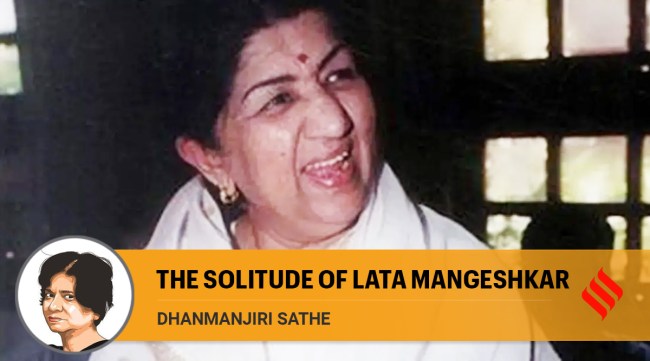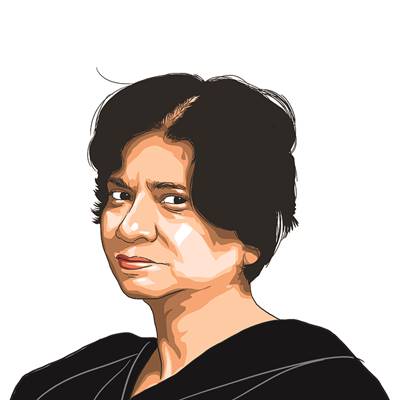Opinion The solitude of Lata Mangeshkar
Dhanmanjiri Sathe writes: Even the most successful women cannot escape loneliness
 Lata Mangeshkar (Express Archive)
Lata Mangeshkar (Express Archive) A few years ago, Lata Mangeshkar was interviewed by Javed Akhtar for a talk show on a private channel. While talking about her struggling years, she mentioned something heart-wrenching. In her younger years, the recording shift used to be from 8 am to 2 pm. All the others — that is, the men — would step out in the middle of the shift and eat. But she didn’t know that there was a canteen and would remain hungry till she reached home. Lata Mangeshkar’s words, “Mein bhooki rehati thi,” evoked the picture of a single woman (unless it was a chorus) in the recording room, struggling on several counts, and going hungry as well. It is touching and annoying that she had to remain “hungry” even when she was earning. I was hoping that Akhtar would probe her a bit more. But, perhaps, sad stories have little currency in today’s advertisement-driven, hyper- enthusiastic world.
The revelation struck a chord for another reason. My grandfather was a schoolteacher in Kolhapur. A Sarvarkarite and a Hindu Mahasabha member, he had connections with Bhalji Pendharkar, the well-known Marathi filmmaker from Kolhapur — also a Savarkarite. Latabai’s (as she was called in Marathi) and her father’s ideological leanings were always clear and so she was close to Pendharkar. My grandfather got acquainted with her. Lata Mangeshkar wanted to visit his house and said so several times. That perhaps might have been somewhat burdensome for my grandfather given his humble station in life. Nevertheless, she prevailed upon him as she was very keen on meeting my grandmother.
Latabai visited my grandfather sometime in 1971-72. She must have been in her mid-forties. She talked about spirituality, how to read and re-read Dnyaneshwari, arguably the most important spiritual text for Marathis. She also said that many-a-times she would get nervous and had a sinking feeling. She wanted to know what she could do to overcome this. More poignantly, she said that she would come back from recordings late, around 3 pm or so, by which time she would have lost her appetite. The food would also become cold, so she would not feel like eating it. It seemed the food problem persisted for decades.
I heard this story then, and it was repeated several times by family members. I was not even a teenager then and with youthful arrogance, I rejected the story outright. My reasoning was simple. Oh, she is rich, she can easily keep some help to give her proper food.
Now I know better. I completely believe her and know that women, even when they are the main breadwinners in the family, can be and are neglected. Sometimes, they could even be made to feel guilty, put on the defensive for various reasons. This is one way of controlling them. This does not happen to the breadwinning men. This is not to blame her family in any way — they were younger than her in any case. All the men from that recording room (from the top male singer and music director to the junior staff) quite likely went back at the same time — probably even later — and got proper, hot meals. But not her.
Another question that Akhtar asked her was: If in her long career, was there any song that had lingered in her mind for long? She thought for a few seconds and answered, yes there was one: “Ae dil-e-naadan”. For the uninitiated, this is a soulful song from the movie, Razia Sultana that Razia hums to allude to her loneliness, desires, and purpose in life. It was written by none other than Jan Nisar Akhtar, Javed’s father.
A penny dropped. What was Lata Mangeshkar, if not the Razia Sultana of Indian music? It was so appropriate she had selected this song out of thousands. Latabai had a rich life with relationships that are well known and need not concern us here. But what about the lingering loneliness of a super successful woman? Can women have it all? It starts with food and goes on. Things have changed a lot for the better over the 70-odd years when she was active.
In the interview, Latabai gave immense credit for all her achievements to her father. In contrast, was Javed Akhtar’s well-known angst towards his father that found expression in several movies. But as Akhtar said in the interview: “Baap to baap hota hai”.
My salute to a life fully lived and loved — Latabai you taught us both. Today, the whole of India is one in its mourning. As a friend put it, “May Latabai now give peace to God’s soul”.
Sathe is an economist based in Pune.







